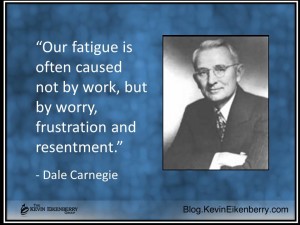Seldom does a day pass without someone telling me they are tired, exhausted, or feel like they need a vacation. Fatigue seems pervasive, a malady that is faced by some at least occasionally, and by many people as a nearly constant state of being. One solution might be to get more sleep, but today, I present another idea, one that might work better and last longer. . .
Questions to Ponder
– How fatigued am I?
– What do I worry about?
– What are the sources of my frustration and resentment?
– How could I lessen the hold these emotions have on me?
Action Steps
1. Really ask yourself the questions posed above – spend time thinking about them.
2. Take action on your answer to the last question – invest the time to take those actions.
My Thoughts
There is a lot that could be said about this short quotation. Carnegie hit the nail on the head – our head, which is where these sources of fatigue come from. Physiologically, our brain uses a large percentage of the oxygen our body takes in. In other words, our brain is a big user of the energy available to us. If we are using that energy on worry, frustration, and resentment, not only doesn’t the brain have time to work on productive things and solutions, but that energy is being sapped for non-productive purposes.
If you are feeling fatigued, consider this quotation and whether or not any of these sources are a cause of that fatigue. If so, take steps to reduce that impact. Not only will you feel better, but you will have more capacity in that amazing brain to accomplish, create, and produce.


Nice post. Neuroscience shows fairly conclusively that our perception of fatigue is really a sensation where our executive functions in the more “modern” conscious regions of the brain are too busy trying to handle issues that should dealt with by our unconscious. This is particularly the case when we have to be aware of rapidly changing and uncertain influences particularly potentially dangerous ones.
One remedy with an ever increasing body of real scientific evidence is the adoption of mindfulness meditation for awareness. Effectively, it gives our conscious mind somewhere to move to when our scattered and difficult thoughts become too much to bear. You can imagine in rather like a “mind gym” with the aim to strengthen our ability to return intentionally to a target of conscious concentration.
Gary
So very helpfull. Thank you!